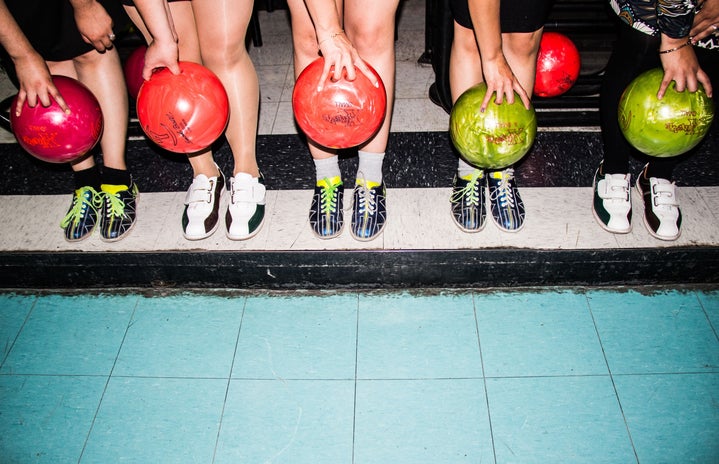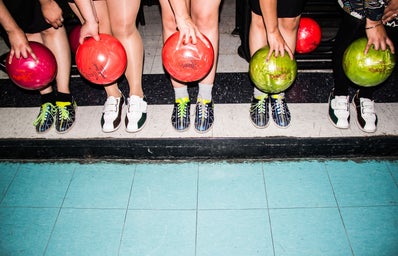I’ve skated since I was a kindergartner and I’ve looked up to Julie Chu since 2010. Julie Chu is an ice hockey forward who played for Harvard University and who competed for the U.S. Women’s Olympic team four times. She is half Chinese and half Puerto Rican, and definitely not what people pictured as the face of women’s ice hockey.
Growing up, I spent a lot of time at a rink where all the hockey players I knew were boys, all the figure skaters I knew were girls, and let’s just say that the ice wasn’t the only thing that was all white. Basically, I didn’t skate with anyone who looked like me. It definitely didn’t bother me or make me feel left out, it just wasn’t common. But watching Julie Chu win that silver medal with the U.S. National team at the 2010 Olympics and prove that she could not only succeed but also excel in both a white and male dominated sport, was a really big deal for me. And I felt that same sense of pride all over again watching Serena Williams and Naomi Osaka’s final match of the US Open this past weekend. It also got me thinking about why representation of women of color in athletics matters.
Setting aside the controversy overshadowing this match, we have the success story of a young player living her childhood dream of getting to face off against her idol and winning. Naomi got to play tennis with her Julie Chu — Serena Williams — who is not only considered one of the greatest tennis players of all time, but also a pioneer in the sport because she reached this point in her career against all odds and amidst the pressure of being brown-skinned in a historically white sport. Naomi did the same and they’re both world champions.
Naomi’s victory at the US Open, and the fact that both she and Serena are at the top of the game, is also a victory for minority representation in athletics. Naomi has been enthusiastically embraced as a Japanese champion, with her victory being heralded by Prime Minister Shinzō Abe. At the same time, she always corrects reporters who fail to acknowledge her Haitian heritage. During an interview following the 2018 Australian Open, she interjected, “Of course I’m really honored to be playing for Japan but my dad’s side is Haitian so — represent! I forgot the rest of your question, sorry.”
The increased visibility of leading female athletes from underrepresented minorities, without a doubt, leaves a lasting impression on youth who are inspired to follow in their footsteps regardless of barriers like race, gender, or economic status. It allows them to never question that they belong in the sport and that makes all the difference. While I am minority in my sport, I have never felt like I didn’t belong on my team, or that hockey was only for boys or only for white people. Perhaps that had a lot to do with role models like Julie Chu, and the public lifting her up as a leading figure of the sport in spite of all the factors that could have stood in the way of her becoming one. Athletes like her and Naomi Osaka, who lead by example by working hard, sacrificing, and persevering to make it to the top, continue that legacy of inspiring young girls of the next generation to find their place and worth through sports.
That’s part of why the Williams/Osaka match was so historic. In persisting with her already extensive career and deviating against countless expectations, Serena Williams, too, is still continuing to set that example as both a female athlete and a minority in the tennis realm. Not to mention her unapologetic self-advocacy during and following the 2018 US Open, which shows us that it’s worth fighting for your place as a female athlete and it’s your well-deserved right to.
Whether or not you were rooting for Serena or Naomi, you were rooting for the success of two great sportswomen and the future of representation in the world of sports. It was more than just about winning and losing, it brought to light the camaraderie in female athleticism. Serena saying to the crowd, “Let’s not boo anymore,” and affirming, “Naomi you did it!” then wrapping her arm around her as she cried on the podium goes beyond sportsmanship. It exemplifies the female solidarity that extended even to many spectators and other players including tennis legend Billie Jean King, who stood by Williams for calling out the double standard of the cheating allegations. She explained that “when a woman is emotional, she’s ‘hysterical’ and she’s penalized for it. When a man does the same, he’s ‘outspoken’ and there are no repercussions.”
While this may illustrate that true equality and diversity in athletics is not exactly a reality, it’s not out of sight. The more we boldly advocate for equality and applaud representation, the more steps we take in the right direction towards changing attitudes about the norms of women’s athletics.
I hope the public will be inspired by Naomi’s journey, this match, and all that it represents, and I hope young female athletes continue to see themselves in Naomi Osaka the same way I saw myself in Julie Chu.
If you would like to write for Her Campus Mount Holyoke, or if you have any questions or comments for us, please email mt-holyoke@hercampus.com.



